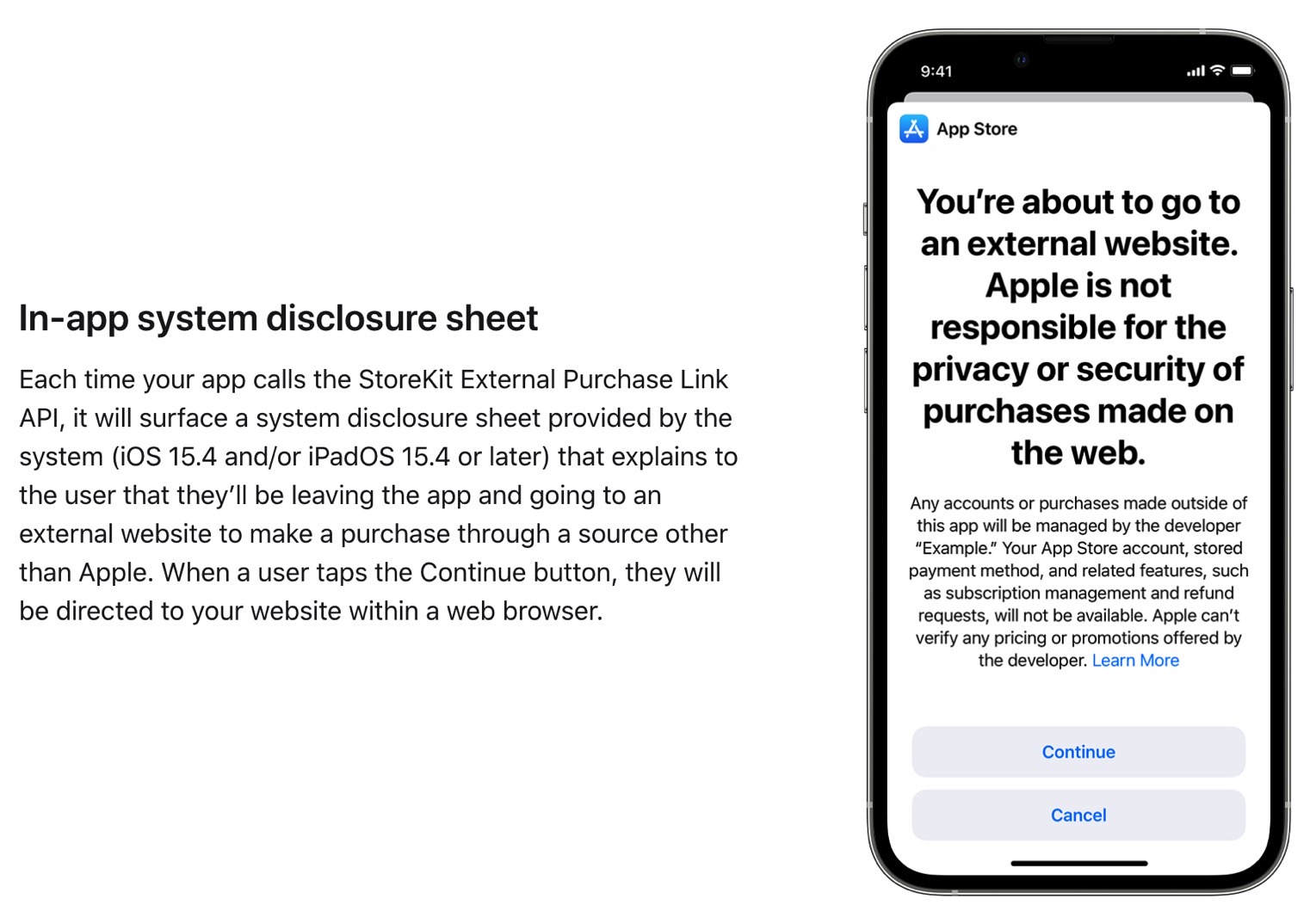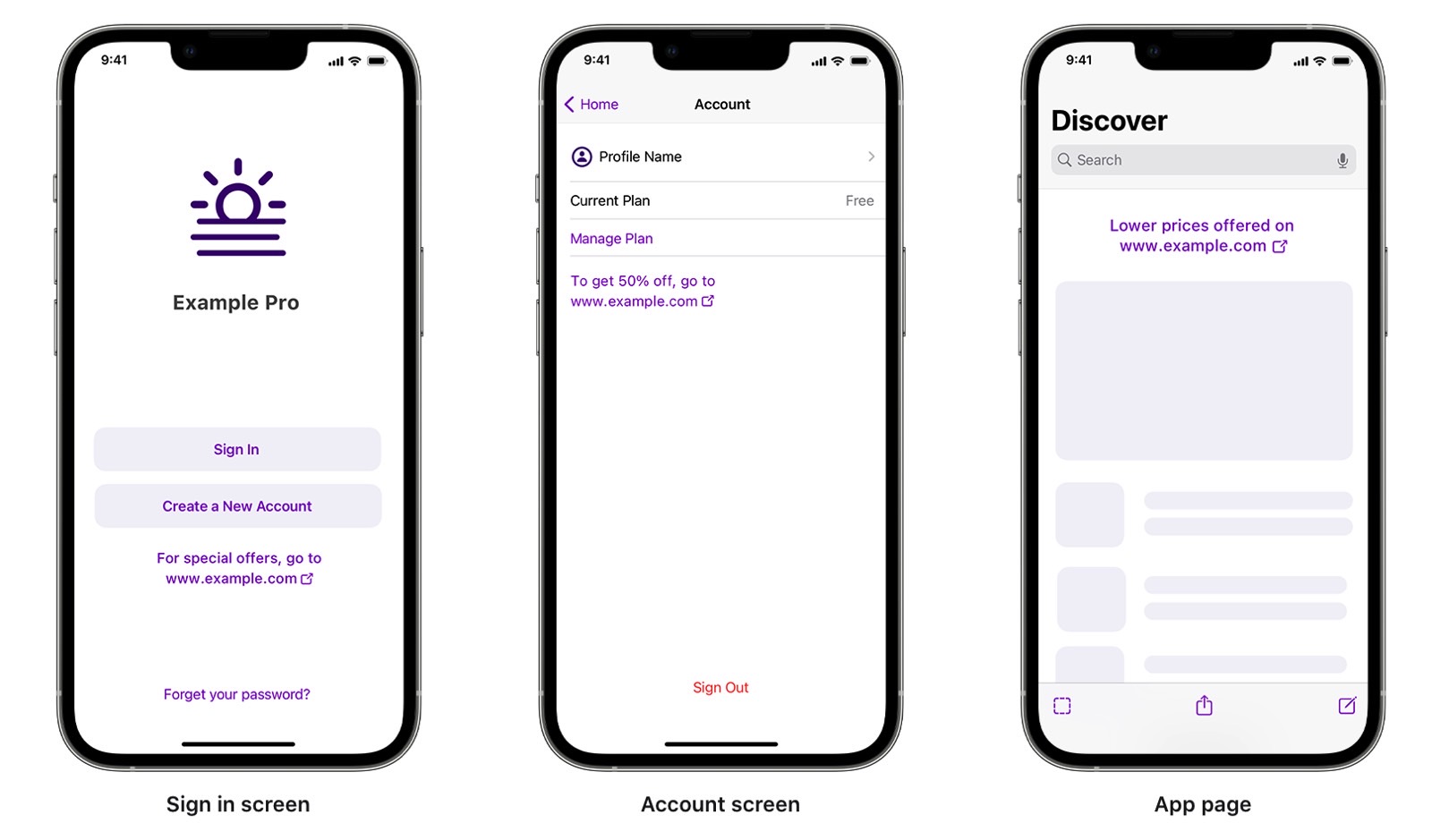iPhone apps will support non-Apple payment systems
Come early March, iPhone and iPad users in Europe will be able to sideload apps. Apple has to comply with the EU’s Digital Markets Act (DMA) legislation and open the App Store to competitors. Sideloading will come hand in hand with third-party app stores and non-Apple payment systems.
Crucially, iPhone sideloading will be restricted to Europe. Apple is reportedly ready to roll out the changes, which will effectively create a different App Store experience for Europeans.
iPhone users in the US will soon get a part of that experience. Apple will let developers link to non-Apple payment systems. You’ll be able to purchase in-app content and subscriptions using third-party payment processors. But don’t expect iPhone apps to get any cheaper. Apple will still collect its App Store tax from developers, even if they provide their own payment processing system.
The new StoreKit External Purchase Link Entitlement feature
Apple has updated its developer guidelines in response to the Supreme Court denying appeals in the Epic vs. Apple case. As a reminder, Apple overwhelmingly won that case, though Epic scored one victory against Apple’s anti-steering policies. As a result, Apple has to allow iPhone apps to link to websites where they can sign up and pay using their own payment systems.
The new guidelines, which explain what developers have to do to enable third-party payment systems in their apps, also mention the new commissions that Apple will charge.
Instead of 30% for digital purchases, Apple will collect 27%. For the second year of a subscription purchase made via non-Apple payments, the fee will drop to 12% from 15%.
Overall, developers will save 3%, but those savings are unlikely to be passed on to the user. The developer now has to pay extra fees for the payment system it’ll use. That includes transaction fees and other costs related to ensuring the security of payments.
As MacRumors points out, the new “Entitlement Links” provisions in the guidelines explicitly mention what developers have to do to ensure the security of transactions:
Developers need to certify that the third-party payment service provider they are using for out-of-app purchasing meets industry standards for payment processors and that they will offer users processes for managing subscriptions, requesting refunds, and disputing unauthorized transactions.
Developers will also have to provide monthly reports of revenue generated through third-party payment systems.
Apple will also collect a 12% fee from developers part of the App Store Small Business Program under the new guidelines.
Back to the 27% fee that Apple will collect from most apps, if it sounds familiar, that’s because it is. Apple has already implemented the same commissions for dating apps sold on iPhone in the Netherlands. This happened in early 2024 following a regulatory ruling concerning the European country.
Conversely, the support for third-party payment systems that Apple will enable following the Epic case will only apply to the US market.

Why it’s fair
You might not like the 27% cut, but that’s only fair, and I explaind this time and again about Apple apps and services. Like iMessage, the App Store is a proprietary Apple technology.
Yes, it’s a storefront that makes apps available on iPhones. And the iPhone would be worthless without them. But the apps themselves and the revenue streams they generate for developers would not exist without the iPhone, iOS, the infrastructure that supports them, and the years of development Apple has put in. All of that cost money to make, and Apple is now just capitalizing on all that.
Anyone in Apple’s place would do the same thing. And indeed, other marketplaces have similar commissions.
We’ve recently discussed about Google’s changes to the Play store that followed the settlement of an antitrust case with 50 state attorney generals. Under the settlement, developers will pay a discounted commission (4% off of Google’s regular 30% fee) when using their own payment options.
I’ll also repeat something I said in the past. I don’t plan on buying apps via third-party payment systems. I wouldn’t do it even if that 27% rate were way lower. The security, privacy, and convenience the App Store provides are priceless to me. All my digital purchases are in one place, and I don’t have to really worry about anyone stealing my data or getting support.
You’ll find the StoreKit External Purchase Link Entitlement documentation on Apple’s developers portal at this link. MacRumors obtained Apple’s statements of compliance, which are available at this link.
Come early March, iPhone and iPad users in Europe will be able to sideload apps. Apple has to comply with the EU’s Digital Markets Act (DMA) legislation and open the App Store to competitors. Sideloading will come hand in hand with third-party app stores and non-Apple payment systems.
Crucially, iPhone sideloading will be restricted to Europe. Apple is reportedly ready to roll out the changes, which will effectively create a different App Store experience for Europeans.
iPhone users in the US will soon get a part of that experience. Apple will let developers link to non-Apple payment systems. You’ll be able to purchase in-app content and subscriptions using third-party payment processors. But don’t expect iPhone apps to get any cheaper. Apple will still collect its App Store tax from developers, even if they provide their own payment processing system.
The new StoreKit External Purchase Link Entitlement feature
Apple has updated its developer guidelines in response to the Supreme Court denying appeals in the Epic vs. Apple case. As a reminder, Apple overwhelmingly won that case, though Epic scored one victory against Apple’s anti-steering policies. As a result, Apple has to allow iPhone apps to link to websites where they can sign up and pay using their own payment systems.
The new guidelines, which explain what developers have to do to enable third-party payment systems in their apps, also mention the new commissions that Apple will charge.
Instead of 30% for digital purchases, Apple will collect 27%. For the second year of a subscription purchase made via non-Apple payments, the fee will drop to 12% from 15%.

Overall, developers will save 3%, but those savings are unlikely to be passed on to the user. The developer now has to pay extra fees for the payment system it’ll use. That includes transaction fees and other costs related to ensuring the security of payments.
As MacRumors points out, the new “Entitlement Links” provisions in the guidelines explicitly mention what developers have to do to ensure the security of transactions:
Developers need to certify that the third-party payment service provider they are using for out-of-app purchasing meets industry standards for payment processors and that they will offer users processes for managing subscriptions, requesting refunds, and disputing unauthorized transactions.
Developers will also have to provide monthly reports of revenue generated through third-party payment systems.
Apple will also collect a 12% fee from developers part of the App Store Small Business Program under the new guidelines.
Back to the 27% fee that Apple will collect from most apps, if it sounds familiar, that’s because it is. Apple has already implemented the same commissions for dating apps sold on iPhone in the Netherlands. This happened in early 2024 following a regulatory ruling concerning the European country.
Conversely, the support for third-party payment systems that Apple will enable following the Epic case will only apply to the US market.

Why it’s fair
You might not like the 27% cut, but that’s only fair, and I explaind this time and again about Apple apps and services. Like iMessage, the App Store is a proprietary Apple technology.
Yes, it’s a storefront that makes apps available on iPhones. And the iPhone would be worthless without them. But the apps themselves and the revenue streams they generate for developers would not exist without the iPhone, iOS, the infrastructure that supports them, and the years of development Apple has put in. All of that cost money to make, and Apple is now just capitalizing on all that.
Anyone in Apple’s place would do the same thing. And indeed, other marketplaces have similar commissions.
We’ve recently discussed about Google’s changes to the Play store that followed the settlement of an antitrust case with 50 state attorney generals. Under the settlement, developers will pay a discounted commission (4% off of Google’s regular 30% fee) when using their own payment options.
I’ll also repeat something I said in the past. I don’t plan on buying apps via third-party payment systems. I wouldn’t do it even if that 27% rate were way lower. The security, privacy, and convenience the App Store provides are priceless to me. All my digital purchases are in one place, and I don’t have to really worry about anyone stealing my data or getting support.
You’ll find the StoreKit External Purchase Link Entitlement documentation on Apple’s developers portal at this link. MacRumors obtained Apple’s statements of compliance, which are available at this link.
